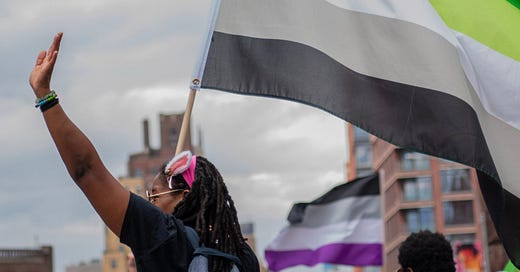Why We Should All Be Listening To Aromantics
Here are some important lessons to learn from the Aromantic community on love
I love writing about love. It’s a fascinating concept and one that always feels deeply indescribable. As if writing about is ones attempt to verbalise the indescribable.
But a perspective we often never hear about when it comes to love is that of the aromantic community. For too long, aromantic people have been shunned in conversations about love.
With the help of Taimi, the LGBTQ+ dating app focused on creating an inclusive and welcoming space for all, i’m going to share some key takeaways that I have learnt about the aromantic community. Why? Because i’ll hold my hands up - I didn’t know a lot about the A in LGBTQIA+ and as our world continues to celebrate and prioritise ‘love’, it feels important to take a look at love from a whole new perspective.
According to its ‘formal definition’, to be Aromantic is ‘to be a person who experiences little or no romantic attraction to anyone’. However, some aromantic people identify aromanticism as existing within a broad spectrum.
Ace is often a shorter version of the asexual identity, which is an identity that is within the aromantic spectrum. Find out more about the full spectrum here.
Cody Daigle-Orians, asexuality educator known online as Ace Dad Advice shared that the often ‘tingly warm feeling you get’ when you see your crush or someone you find attractive as a feeling that ‘rarely happens’ for them.
But aside from the basics, how can we learn from the aromantic community?
Love Isn’t Just About Romance
It’s about time we knocked romantic love off its pedestal and stopped seeing it as the be-all and end-all when it comes to where we source love. Aromantic people celebrate the love they gain from their community, the love they get from their chosen family and friends, and the love that they have for themselves to create a well rounded and diverse pool of ‘sources of love’.
You Don’t Have To Chase ‘The One’
Whether it be films, TV, books or even news cycles and social media - feeling like there is one puzzle piece out there for us to make us ‘whole’ is something we all can feel indoctrinated to believe. The monogamous life isn’t something that fits everyone, and for aromantic people the idea of finding one romantic partner to ‘complete’ ones life is something many would reject entirely. Friendship and chosen family can be just as powerful as romance.
Regarding the ‘rom-com’ obsessed world we live in, Daigle-Orians shared how their unique perspective is what they enjoy the most about being aromantic. "While the features of your favorite rom-com are what love and romance mean for most people, the aromantic community looks at them from an entirely different perspective. And they have a lot to teach everyone about love and romance.”
Real Relationships Go Beyond Romance
Within the LGBTQ+ community, finding like minded folk to speak and relate to is a relationship that is vital to many peoples progress and growth. For many aromantic people, their queerplatonic relationships are what fills them with joy and love. It’s a unique blend of respect, mutual understanding and platonic connection that doesn’t need to involve romance to be ‘valid.
Learning about aromantic love isn’t about pushing romantic love out of the conversation entirely, rather instead about normalising love in all its forms and making sure that we understand how so many aromantic people experience the world. Why? Because our community works better together, so understanding every experience is what’s pivotal in our collective strength which we need in bucket loads right now.
Thank you to Taimi for conducting this research, and to Cody Daigle-Orians for sharing their experience with us here too.
Interested in finding out more? Taimi have a ‘How Aromantic Are You?’ quiz which you can look at here to understand your own love language, and find out more about how we can continue breaking outdated myths about love.
Download and learn more about Taimi here.





